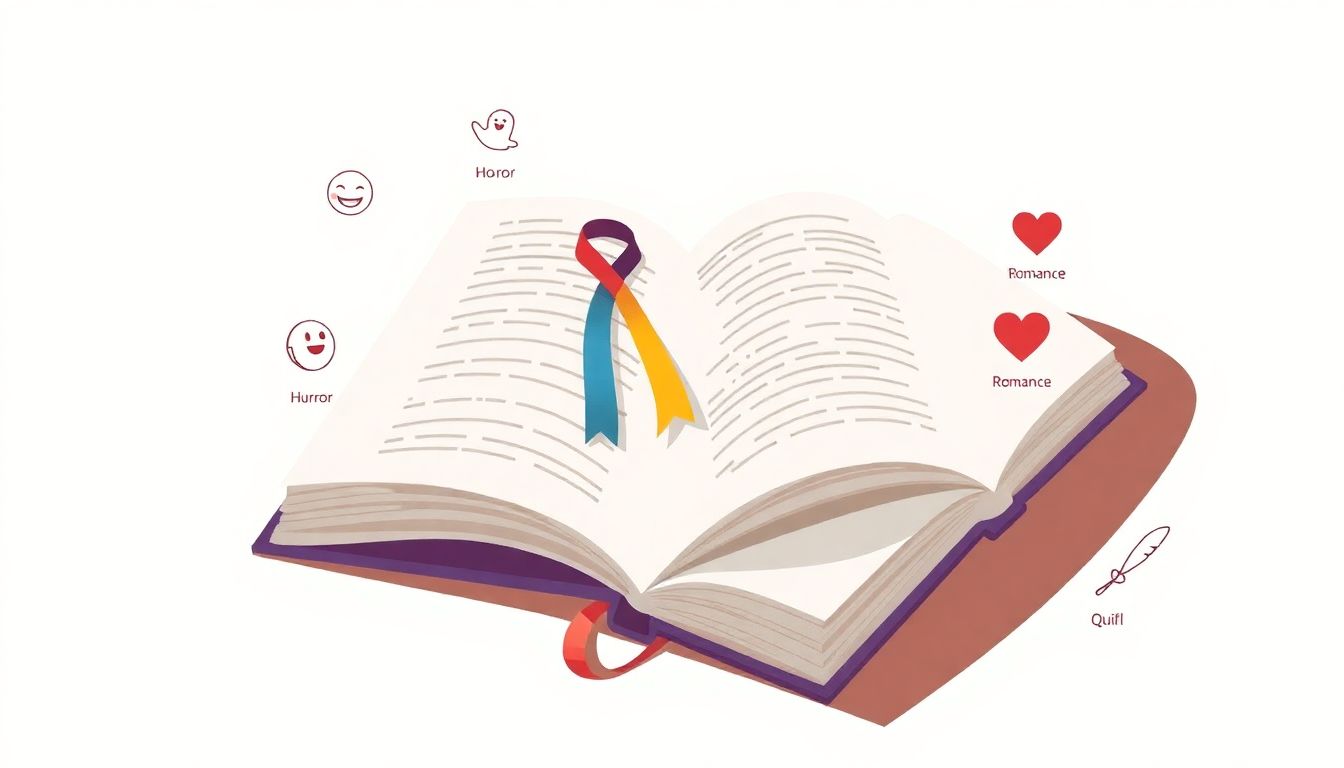Winning book awards sounds awesome, but figuring out where to enter your book can feel overwhelming. With hundreds of contests each year, choosing the right ones is enough to stress anyone out.
Relax—I’ve got your back! In this guide, you’ll find a curated list of the best book awards to enter in 2025, whether you’re targeting prestigious mainstream prizes, indie-friendly competitions, or genre-specific awards. Plus, I’ll toss in practical tips to streamline your selection process.
Ready? Let’s get started.
Key Takeaways
- Clearly define your goals (credibility, sales growth, prize money, audience) before selecting awards to enter.
- Review eligibility requirements, deadlines, and past winners to identify the best matching competitions.
- Go for big-name awards like the National Book Awards or PEN America Literary Awards if visibility and credibility matter most.
- Indie and self-published authors benefit from contests like IPPY Awards, Libby Book Awards, and Readers’ Favorite Awards.
- Enter genre-specific awards that closely match the style and theme of your book (e.g., Bram Stoker for horror).
- Consider regional, mid-level, or reader-driven competitions too—these can provide valuable exposure at lower cost.

Step 1: Choose the Right Book Awards to Enter in 2025
The first step in tackling book awards and competitions is figuring out which ones are actually worth your time (and possibly your entry fee). Book awards and competitions are honors given to authors and works of literature to recognize outstanding storytelling, creativity, and contribution to the literary community, and choosing wisely can give your book much-needed exposure.
Keep your goals clear right from the start: are you searching for more credibility as an author, increased book sales, connecting with a new audience, or some sweet cash prizes? Different awards offer different perks—so figuring out what matters most to you can save tons of energy (and frustration!) in the long run.
Pay close attention to award eligibility requirements and submission timelines. Timing is crucial—for example, the prestigious National Book Awards 2025 submission period runs only from March 12 to May 14. Miss those dates and you lose a massive opportunity.
Here’s another practical tip: browse previous winners and finalists of an award you’re considering. This tells you exactly the type of books that typically excel in those competitions. Do these winners’ styles and themes match your own book? If your book is a humorous children’s adventure, awards celebrating gritty historical fiction probably aren’t the best fit.
Step 2: Top Prestigious Book Awards to Focus On First
Let’s be real—if you’re entering book awards, you’ll want at least one of the heavy hitters on your author bio. Some awards carry major clout and credibility, immediately signaling to readers that your book is exceptional. Aim for at least one prestigious competition while planning where you’ll submit.
For literary fiction, nonfiction, poetry, and young people’s literature, the National Book Awards tops many authors’ wish lists. Winners gain major publicity—think increased sales, recognition from key literary figures, and a massive boost in credibility. If those potential benefits appeal to you, mark their dates (finalists revealed October 7, winners announced November 19, 2025) and start prepping your submission early.
Another big one you should definitely consider is the PEN America Literary Awards. With categories in fiction, nonfiction, poetry, essays, and translation, PEN awards nearly $350,000 in prize money annually. Plus, PEN America strongly champions free expression and social justice issues, so if your book has important cultural insights or sheds new light on vital topics, entering here could strongly align with your values and amplify the impact of your work.
Looking for recognition in children’s books or middle grade? The American Library Association Youth Media Awards—which includes prestigious honors like the Newbery Medal awarded to titles like 2025’s “The First State of Being” by Erin Entrada Kelly—could be your ticket to wider readership (and acclaimed recognition).
Step 3: Best Awards for Indie and Self-Published Authors in 2025
If you’re an indie or self-published author, fear not—numerous book awards and contests specifically celebrate independently published works. Entering these competitions helps level the playing field, getting you recognition and credibility without needing big publisher backing. Want the inside scoop on how to kickstart your indie publishing journey? Check out this detailed guide on how to publish a book without an agent before diving into competitions.
Consider industry-respected competitions like the Independent Publisher Book Awards (IPPY), which recognizes excellence in independently published titles across dozens of categories. Indie authors who’ve snagged an IPPY have parlayed that recognition into significantly increased book sales and wider distribution opportunities.
An indie favorite in recent years has also become the Libby Book Awards. Chosen by over 1,100 librarians and library staff, this award handed “Best Science Fiction and Debut Author of the Year” to “The Ministry of Time” by Kaliane Bradley in 2025. Librarian-endorsed awards mean wider library adoption, increased reader trust, and potentially broader local press coverage. Not a bad deal at all.
Finally, word-of-mouth recommendations come naturally with indie successes, so consider awards that readers themselves notice and care about, like the Readers’ Favorite Awards and the Next Generation Indie Book Awards. Reviews and reader recognition from these can considerably boost your book visibility and sales potential.

Step 4: Specialized Awards Based on Your Book’s Genre or Topic
To pick specialized awards, first take a minute to clearly define your genre or main topic—you’ll find a lot of competitions tailored specifically to what you’ve written.
If you wrote a gripping horror novel, for example, competitions like the Bram Stoker Awards could seriously boost your book’s visibility and credibility among horror fans.
Wrote something funny for young readers? Humor-based contests like the Thurber Prize for American Humor could work well if your book is targeted slightly older, or check out specialized competitions highlighted in these funny writing prompts for kids to see what’s hitting the mark for younger readers these days.
And if your niche is graphic novels or illustrated storytelling, awards like the Eisner Awards or Harvey Awards are definitely your best bet—winners here often gain a strong following from comic and graphic novel enthusiasts worldwide.
Don’t forget to explore awards in more specialized categories like historical fiction, romance, and nonfiction topics, too—winning niche awards can significantly boost your credibility with targeted readers.
Step 5: Additional Valuable Book Competitions to Consider Entering
Apart from the super prestigious and indie-focused awards, there’s huge value in entering smaller or mid-tier competitions as well—you never know which honor could spark reader interest or catch the eye of influential readers.
Check out the Readers’ Favorite International Book Awards because readers themselves help determine the winners, giving your book the authentic, trustworthy appeal that can boost sales.
Regional awards like the Midwest Book Awards or the California Book Awards might fit well, especially if your book has a strong local angle; local wins often get solid local press coverage and can lead to events in your community.
Also, look into awards recognizing innovative formats, like those specifically for graphic novels, interactive ebooks, or audiobooks—winning could significantly increase reader curiosity and media attention.
Keep an eye out as well for competitions connected to literary festivals or industry-specific conventions, providing direct promotion opportunities through in-person events and author panels.
Step 6: Tips for Picking the Right Awards and Competitions for Your Book
Wondering how exactly to know if a specific book award is worth entering? The answer is simpler than you’d expect.
First, look at who judges the competition—are they credible professionals or industry peers whose opinions actually matter to your audience?
Also, pay attention to categories closely matching your book—a vague fit won’t do much good, so ensure you’ve found a strong match.
Double-check the submission fees (they add up fast), and set a clear overall budget.
Browse the previous winners’ titles and styles—does your book align with them?
And always read submission requirements carefully—missing a simple detail is enough to disqualify an otherwise solid entry.
Finally, enter book awards and contests strategically—don’t submit everywhere at random, pick carefully based on your goals.
If you’re still stuck about this whole publishing journey, this handy breakdown about how to publish a book with a publisher could also be helpful before you dive into entering awards.
FAQs
Self-published authors should prioritize reputable indie-focused awards such as the Independent Publisher Book Awards (IPPYs), IndieReader Discovery Awards, and Foreword INDIES Awards. These competitions openly acknowledge and celebrate standout indie and self-published books.
Yes, genre-specific awards help authors gain targeted visibility among specialized audiences. Choose awards based on your precise genre and category. Examples include Mystery Writers of America’s Edgar Awards for crime and Hugo Awards for sci-fi and fantasy.
Review past winners to assess compatibility with your book. Check entry fees, deadlines, prize value, and media coverage offered. Prioritize established awards recognized by your target readers, booksellers, librarians, or your genre community.
Consider prestigious general awards like the Pulitzer Prize, National Book Award (USA), Booker Prize (UK), and PEN Literary Awards first. Recognition from these honors significantly boosts credibility and attracts widespread media attention to your work.
